A perfume manufacturing company manufactures and sells (usually wholesale) perfumes, probably the most popular type of perfume manufacturing in SA at the moment is selling “generic” versions or perfume “inspired by” leading international brands. This page will cover that; I will cover developing your own scent in future.
Getting Started
There are two strategies when making perfume, one is to develop and sell a perfume based on a fragrance you developed (by mixing different scents) the other is to sell generic versions of expensive brands. The latter is the most popular locally as people already know what perfume they want to buy and know how it smells like due to the brand visibility (you can go into any Edgars and spray samples on you). It is difficult and expensive to develop your own brand to take to market (although it is done in smaller quantities in boutiques).
That is why most small business just makes generic “inspired by” versions. I just want to touch on the fact that making generic versions is not considered counterfeiting unless you put the brand holders logo and name and knocking off the bottle and packaging. In other words you can call your perfume “Clifton Sands” and say “Inspired by Dolce & Gabbana Light Blue”, it will smell like “D&G Light Blue” but it’s Clifton Sands – your brand. You are not making fake perfume but generic versions of major brands; you are not passing off Clifton Sands as Light Blue.
Anyway before I digress you can read this article (https://www.news24.com/SciTech/News/Fake-perfume-not-illegal-20101114) on the legality on generic brands, but I’m sure you’ve seen generics in reputable shops in malls (Fragrance Boutique being a good example which sells “generic equivalents” which is based on the same technique of reverse engineering that you will do); even Checkers sells generic versions of major brands in their stores.

Generic perfume in Checkers
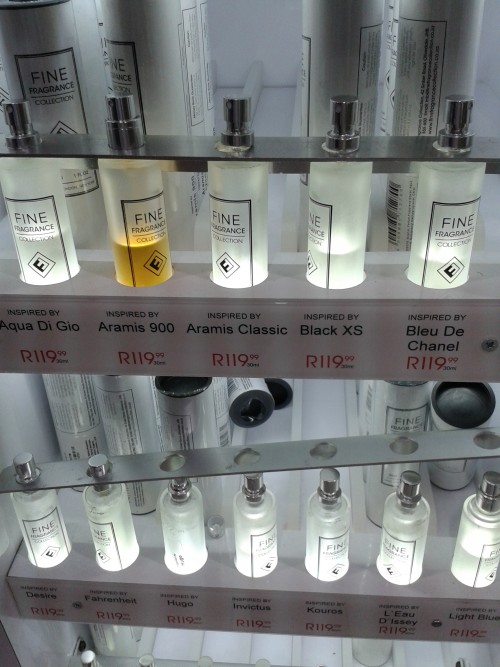
Generic perfume in Checkers
Getting Started
To get started in this business you essentially need three components: the fragrance oil (this is basically the concentrate), the alcohol (this thins down the oil and is essentially a carrier to blend it) and the bottle to package the perfume in for resale.
The oil and the alcohol are mixed and stand for a while before it is bottled. This is where things start to deviate supplier to supplier based on the formulation they use. Each supplier with have different mixing instructions (regarding the ratio of oils to alcohol) and also how long the perfume need to stand for maturation once mixed (this could be crucial in high volume turnaround).
So let’s say a supplier recommends 200g of oils to 800ml alcohol this will produce a liter of perfume. Once mixed and matured (get yourself liter glass bottles that can close like decanters), then the perfume is ready to be filled into individual bottles (with 30ml and 50ml bottles being the most popular). For every liter you make, it will yield thirty-three 30ml bottles or twenty 50ml bottles.
The numbers
There are three expenses to consider when manufacturing perfume:
- Perfume Oil
- Alcohol
- Bottle
Stickers to label the bottle (I don’t really advise boxing the bottle as this will add to the expense, you can brand the bottle using printing but this will add to the expense as well), so maybe just a sticker containing your brand and a sticker with the fragrance inside the bottle.
There are many suppliers in SA where you can get oil and alcohol from depending on your quantity, if you go high volume you can get the oil from a place like Scent Lab and the alcohol from Enterprise Ethanol (they sell a product called Fragrasol for this purpose).
But let’s run the numbers from a smaller supplier called Scentsational (who sells all three components and is more accessible to small business owners):
Lets make a batch of generic Issey Miyake Nuit D’Issey Pour Homme, according to the description of the official item “Issey Miyake’s Nuit D’Issey is a magnetic and vivid composition that evokes dark nights, with accords of grapefruit and pink pepper, and heart notes of leather and vanilla for an elegant twist. Created for men of mystery, its rich and textured base reveals tonka bean absolute and patchouli for warm, aromatic spice.” Sounds really nice (no wonder international brands are so expensive can you imagine what it cost to hire a copywriter just to write that paragraph?), so we making a liter of the stuff.
Our supplier recommends a 1:4 ratio mixing formula. In other words to produce a liter we will mix 200g of oil to 800ml of alcohol.
The supplier calls this generic oil “CRISTAL NIGHT AM3339/E” and it costs R199.73 (including VAT) per 200g.
Then we get the alcohol, their alcohol product called Fragrasol costs R41.40 incl vat per liter. This means we need 4/5 of this bottle (800ml) which means our cost here is R33.12.
To produce a liter of let’s call it “Khoi Capital Black” will cost R232.85 (R199.73 + R33.12). We will be making 50ml bottles, so let’s get a price on that at the same supplier. Ooh I really love this “black mist bottle”
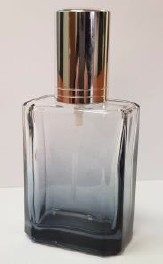
Black Mist bottle – Scentsational
It’s a bit steep at R7.50 ex vat a bottle but I think my perfume will look really great in it and it’s a 50ml bottle. Then we add VAT to this price (15% these days since we’re picking up the tab for the Gupta’s little African adventure) which brings the bottle price to R8.63 rounded off per bottle. Times this by twenty and we get R172.60 for the twenty 50ml bottles to house our liter of perfume.
In other words to produce twenty 50ml bottles of Khoi Capital Black it will cost R232.85 for the perfume and R172.60 for the bottles for a total of R404.45 divide this by twenty and we get a cost per bottle of R20.27
As for the stickers (to paste on the bottles with the scent name) get a labeling machine: it will cost a few cents per bottle.
Business Model
Now you must be thinking wow I’ve seen these generics sell for R100 a bottle, I’m be making R79.73 a bottle in profit. No, not really, because this is not the best manufacturing business model, yes you can sell direct but how many buyers are you going to find? You need to sell to people who will resell, let them find the buyers. Your business model is manufacture and wholesale. Who cares about making R79.73 now and then when you can have hundred of agents selling your product all of whom are bringing in multiple orders, from their neighborhood from their workplace from their church from wherever?
But the question is how much should you charge? I say it depends. If you can scale this operation, capacity wise to selling at least 100 bottles a day then charge as little as rationally possible.
This will mean your profit per bottle is much less, you need to make it worth their while, let it be their side business and you are their supplier. How much should you charge to scale this business up and make it really interesting for your agents? Let them make double the amount of money that it cost them, this will really motivate them. If it retails at R100 a bottle then sell a bottle for R50. This translates to a profit of R29.73 per bottle for you. If you move 100 bottles a day this means a profit of R2973 per day (R29.73 x 100). Times this by a six day week (Saturdays are popular collection days for agents) and you have profit of R17838 a week and R71352 (2973 x 6 days x 4 weeks) a month (that’s profit not revenue). This is gross profit though, so you need to factor in your expenses, are you renting shop space? Do you have staff? If so how many? Transporting goods etc.
Expanding your business
Be lekker to your agents, help build them up, give them good advice, put a photocopier in your shop and let them print flyers where they can write their name and phone number on with the retail price (or charge more per bottle and give them flyers for free).
Capital requirements
Here comes the real business, this is a easy business to get into, but it soon gets expensive because remember there are many popular perfume brands on the market and if you just want to carry 100 different brands, I mean varieties (we can’t call it brands remember), then it will cost you over R40 000 to produce a liter of each (R404.45 x 100), in other words two thousand 50ml bottles (1 liter produces twenty 50ml bottles x 100). But once sold that R40000 will produce revenue of R99460 and a gross profit of R59460. Now there are a few ways to cut this to start with less capital, one of the ways to do so it to start by selling less variety lets say ten of the most popular perfumes on the market (mainly feminine scents as females are often the most popular clients), then you need a smidge over R4000 to get started. This will produce 200 bottles in total with revenues of R9946 and a gross profit of R5946 (you don’t need much overheads now as it’s something you can run from home). If you can move all that product in a week you still make a profit of R23784 a month (R5946 x 4), just replenish your stock once a week or so as the money comes in.
This is one of the hottest businesses around right now and if I were unemployed it is something I would have looked into. Just remember you need to create your own brand, own logo etc.
So when you have a catalogue it will say something along the lines of:
Clifton Sands inspired by Dolce and Gabbana Light Blue
Khoi Capital Black inspired by Issey Miyake Nuit D’Issey
Here is a flyer I made for my fictional brand:


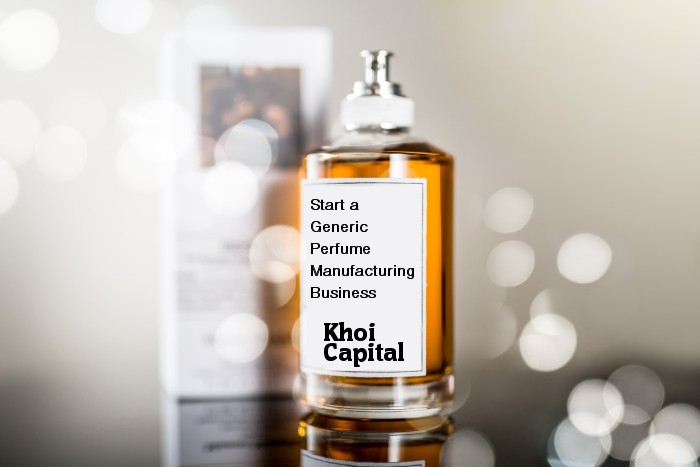
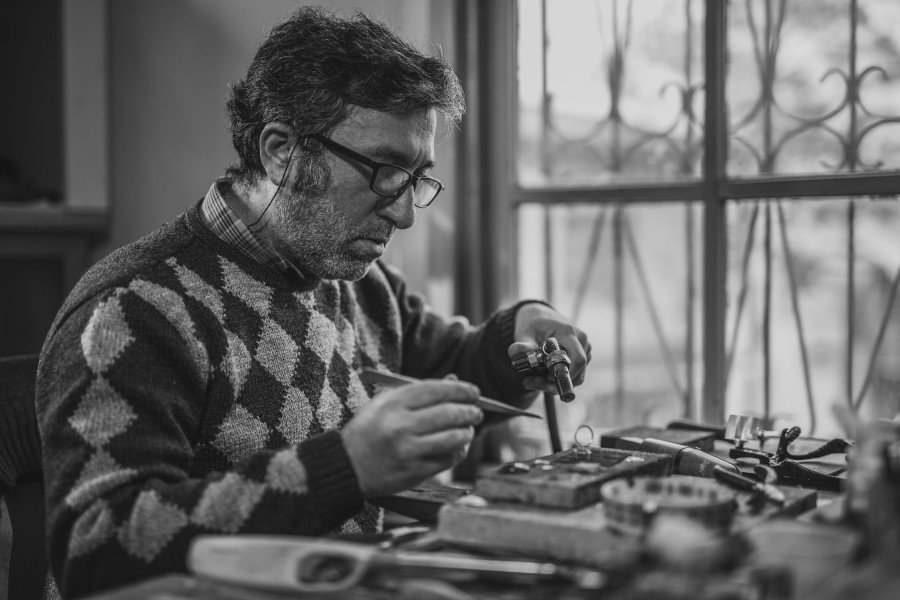


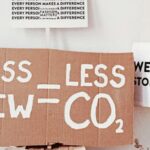



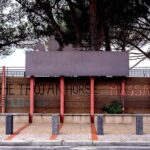
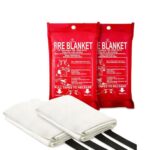


1 Pingback